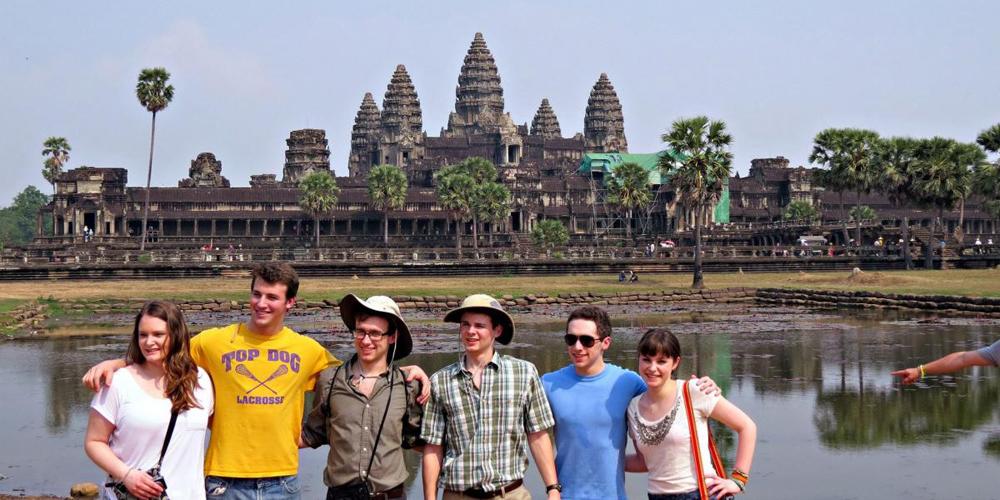 Cambodia The Sustainable Development and CSB teams posing in front of the Reflection Pool at Angkor Wat
Cambodia The Sustainable Development and CSB teams posing in front of the Reflection Pool at Angkor Wat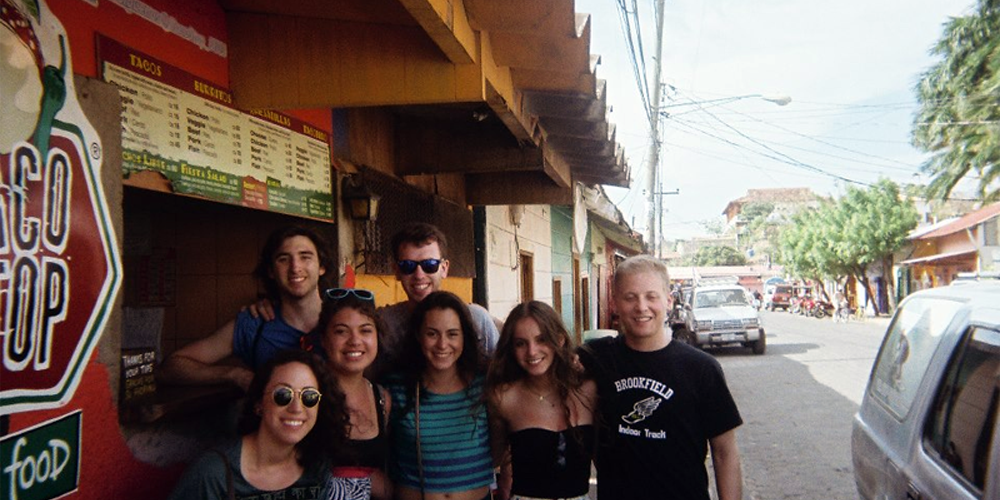 Nicaragua Charlie Baldwin, Connor Luther, Eleni O'flarity, Kevin Hoogenboom, Amberlyn Alualu, Emma Fried, and Melanie Grinnel at our favorite taco stand!
Nicaragua Charlie Baldwin, Connor Luther, Eleni O'flarity, Kevin Hoogenboom, Amberlyn Alualu, Emma Fried, and Melanie Grinnel at our favorite taco stand!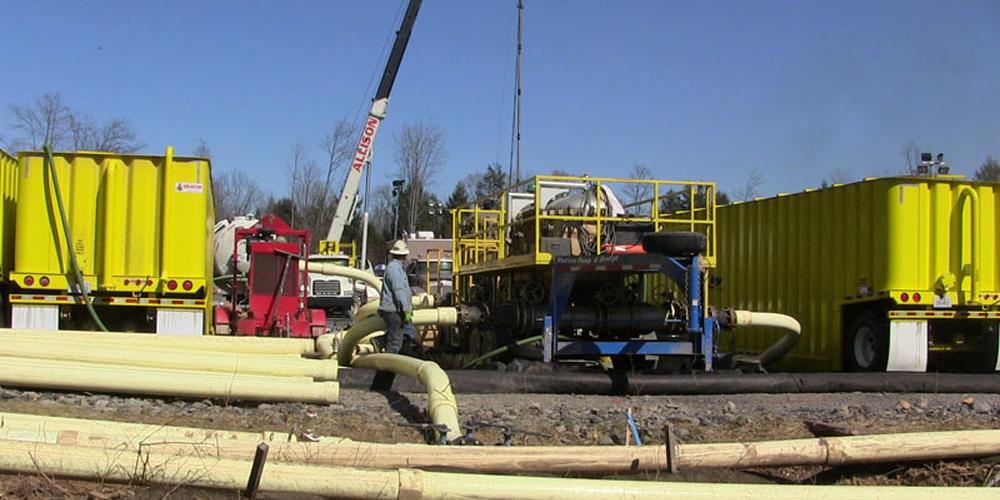 Pennsylvania Fracking Fracking Well Pad
Pennsylvania Fracking Fracking Well Pad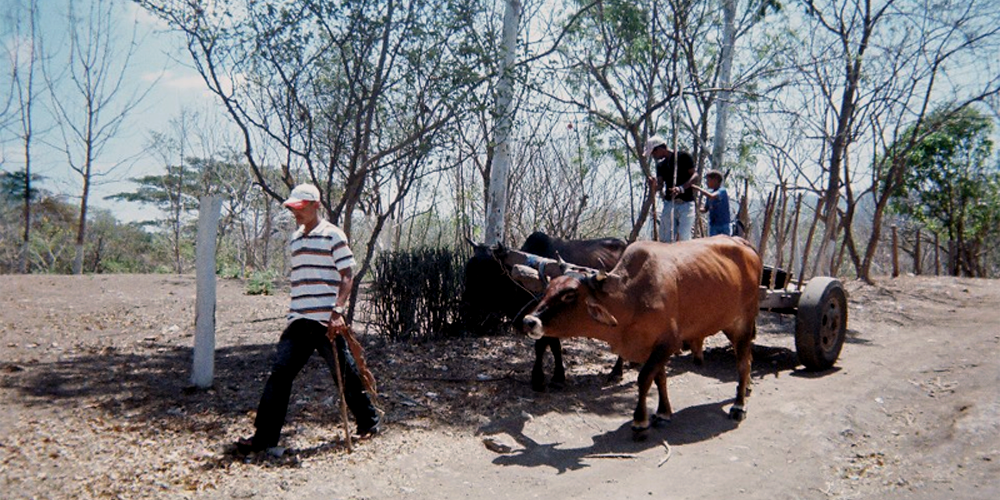 Nicaragua The people in the rural village do not own cars so they must use other means of transportation and find alternative yet efficient ways of carrying heavy items along the dirt road and in the hot sun.
Nicaragua The people in the rural village do not own cars so they must use other means of transportation and find alternative yet efficient ways of carrying heavy items along the dirt road and in the hot sun.
Nicaragua
Partner
Newton/San Juan del Sur Sister City Project
Summary
Our sustainable development project was to partner with an NGO, the Newton/San Juan Sister City Project, based in San Juan del Sur, Nicaragua along with EWB from Lehigh University. Our inter-disciplinary team spent a week in Nicaragua working on several different projects in rural communities. Now we wish to establish a longer term project and are trying to decide what project would be most beneficial for the community, and still be manageable for our group. A couple of the options are a free high school for adults, a solar powered water system, or more help with water filters
The Partner
The Newton/San Juan Sister City Project has been around for almost 25 years. This organization has no paid staff, save for the in-country treasurer. The focus of this organization is education (including school building and maintenance as well as the Free Adult High School), public health technology and green buildings.
NicaCan began as a student group at the University of Calgary, and brings down students from Canada. NicaCan has a bigger budget than The Newton/San Juan Sister City Project does, and they pay Antonia Mendoza's salary, although Newton pays for most of her transportation costs. Fundación Tierra/Earth Fund is an NGO founded by an American developer in San Juan, Fred Goldfarb. It mainly consists of Antonia Mendoza, who is the person-on-the-ground when there is no one in Nicaragua. Her main focus is on monitoring/repairing/re-installing BioSand Filters and helping with occasional eco-stove projects.
The three organizations essentially function as one unified organization, although each of them has a slightly different overall focus.
We are also working with students in Engineers Without Borders, which is an international non-profit organization that helps different communities in need by providing them basic needs. The organization focuses on projects that address issues such as providing clean water, education, sanitation, and renewable energy.
The Context
The Newton/San Juan Sister City Project has built (or rehabilitated) about 18 schools in the 35 rural communities in San Juan del Sur. They also have installed BioSand Filters in 20-25 communities, and eco-stoves in about 15. They had a two-year project to manufacture and install over 600 concrete BioSand Filters, which was successful at first, but the number of families still using their filters properly has steadily decreased since 2007. Today only 60-70% are still in use. The reasons for this are many and varied, which is something they are trying to research in order to know the reasons of why certain families give up on their filters. The organization’s main concerns include:
- Low levels of education: families don't understand the importance of clean water
-
Hygiene
-
Poverty: which includes:
-
Malnutrition
-
Hopelessness
-
Lack of basic resources to better family life
-
-
Machismo: relegates women and girls to inferior roles
-
Domestic violence: including sexual and physical abuse of minors
-
Alcoholism: mainly a problem of men, who then destroy family cohesion
-
Obesity and diabetes
-
Poor housing: dirt floors, leaky roofs, insects and rodents as well as domestic animals in the house
-
Financial illiteracy
Machismo, sexual abuse, domestic violence, and sexual exploitation of minors are a set of interrelated problems the organization is concerned with but have not made major efforts to confront. They do, however, help the only women’s shelter that currently exists in San Juan del Sur.
The Challenge
One major issue that the San Juan del Sur Sister City Project has run into is the lack of funds and volunteers. In particular this issue has affected the Free Adult High School for Adults that the organization is in the process of building. This high school will optimally serve to educate Nicaraguans who are excluded from the local high schools (anyone over 18, pregnant girls, mothers, people who live too far, people who work all week, etc.) Some of the campus has already been built by other volunteers and with the help of AJWS, but very little of the construction has been green or sustainable, and the progress has been slow. There are times when there is a large influx of volunteers and work on the school moves rapidly, but there are also times when San Juan Sister City Project has only one person on the ground in Nicaragua, and progress comes to a crawl. Money has not been an issue until more recently. The school has been fairly successful, and has therefore grown in size. This growth raises the cost of running the school, which puts a financial burden on the NGO.
These issues of resources are not just related to the free adult high school. The Sister City Project runs into similar issues with many of its other projects. Although we have not settled on what project we will be taking on, it is already clear that funds and man-power will be two essential resources to ensure that the project is successful.
The Project/Solution
The Nicaragua team’s current approach involves working closely with Engineers Without Borders to develop a project in the area where there appears to be the most need at any given time. Ideally, our project would start with us but then continue and expand with future Sustainable Development classes and with future Engineers Without Borders groups. Because Engineers Without Borders is looking for a new location and in-country partner (as travelling to Honduras is prohibited at this time), we thought it would be beneficial to collaborate with this group to accomplish some of the goals we’ve set for ourselves.
As of right now, one of our main goals is to establish a relationship with the Sister City Project, Earth Fund, and/or Nicacan in order to gain an understanding in where a group like ours could be the most useful. Thus far, we’ve explored a variety of topics including installation of sand water filtration systems, solar powered water systems, eco-stoves, construction of schools/housing, etc. Our group could serve as a consulting middle-man to communicate with the NGO to form a three way partnership between our team, Sister City Project, and Engineers Without Borders. The first step would be to organize a PowerPoint presentation to give to Engineers Without Borders explaining the situation in San Juan del Sur. In this presentation we would outline the possibilities for projects down there and the challenges in working with these NGO’s. We would further explain various social, economic, environmental, and political obstacles that the existing NGO’s are facing, and introduce a plan of action that Engineers Without Borders could take if they choose to partner with us.
This presentation would be the first step in our endeavor to help out the NGO’s in San Juan Del Sur. We think that building up a team that combines the minds of both Sustainable Development students and Engineers Without Borders would be an invaluable advantage to making a difference down in Nicaragua. If we end up going through with this partnership, we would meet with the EWB group to decide in which direction we’d like to go in terms of a project in San Juan del Sur. We have some ideas, including the Free High School for Adults, but we think it more important to emphasize the broad scope of need that is present in San Juan del Sur that the NGO’s are looking to improve. We think that a collaboration of ideas will be the most effective in developing a project that could really improve the quality of life of the people we’d be working with.
The establishment and implementation of this relationship is our plan for this semester. Past that, there is the possibility for another trip down to San Juan del Sur either in late summer or next fall, but we think that before we move forward with future travels, we must first develop a solid idea of what kind of things we want to accomplish down there.

The people in the rural village do not own cars so they must use other means of
transportation and find alternative yet efficient ways of carrying heavy items
along the dirt road and in the hot sun.

Local school children Emma Fried, Eleni O'flarity, and Amberlyn Alualu met while doing the
book mobile. The baby in the picture is only three months old!

An almost-finished eco-stove that we installed in a villager's home.
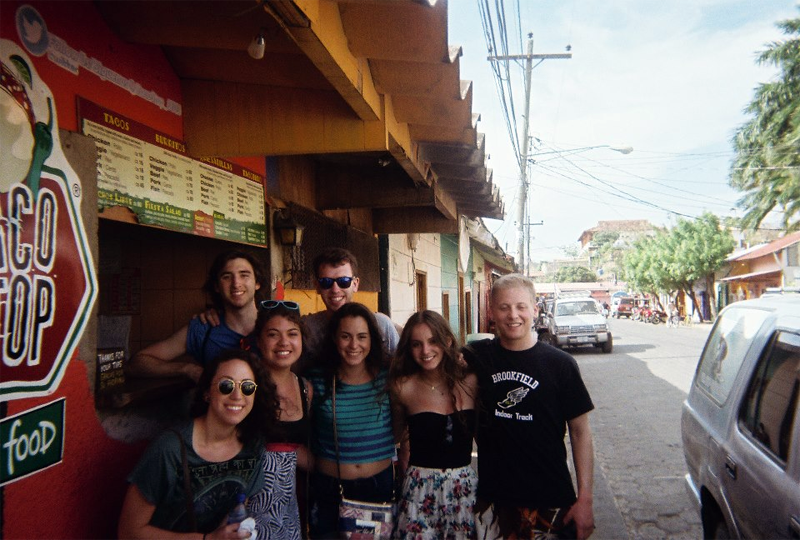
Charlie Baldwin, Connor Luther, Eleni O'flarity, Kevin Hoogenboom, Amberlyn Alualu,
Emma Fried, and Melanie Grinnel at our favorite taco stand!
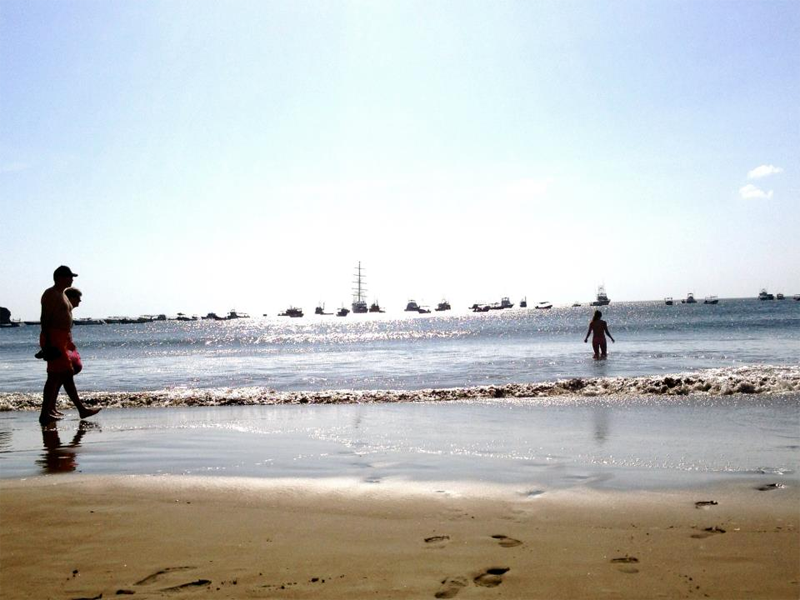
The San Juan del Sur beach was beautiful right before sunset!
Team
Our group consists of students with various majors, which is beneficial due to the interdisciplinary nature of this project. There are three environmental engineers (Connor Luther, Charlie Baldwin, and Melanie Grinnel), a political science major (Eleni O’Flarity), an international relations major (Emma Fried), and a global studies major (Amberlyn Alualu). Together, we have been able to collaborate our knowledge of the technical and social/cultural aspects of this project in order to hopefully make it a success. The variety of majors within our group was particularly helpful during our first, and thus far only visit to Nicaragua; the environmental engineers worked to install the eco-stoves while the arts and science students worked with members of the community to understand the types of aid they may need. The arts and science students were also able to work with children from the local community while they participated in the book mobile (a mobile library that travels to the schools in the community).
Our group leader, Dan Zeroka and project coordinator, Julie Napotnik, also played crucial roles in ensuring a successful trip. Dan was very knowledgeable when it came to installing the eco-stoves and helping with the other technical aspects the job entailed. Julie was familiar with the community we were working in, as she had been there multiple times installing her bio-sand water filters. Three Engineers Without Borders students also accompanied us on our trip (Adam Long, Carlie Skellington, and Kevin Hoogenboom) to serve as representatives for Engineers Without Borders. Their goal was to find a project in Nicaragua that EWB could work on with us. Lastly, a woman from the local NGO, Antonia, was extremely helpful. She helped us arrange our meetings and projects with the community. Overall, our trip was a success because of the contributions from this interdisciplinary team.
The Future
As of now, the future of our project has some uncertainty due to the fact that it is not a guarantee that Engineers Without Borders will choose Nicaragua as the location for its next project. However, we are confident that we will be able to work with EWB, and if SJDS turns out to be the next location for the club, then the aspiration is to establish a close relationship between the EWB chapter at Lehigh with the three NGOs of San Juan del Sur, as stated in our the Project/ Solution. There seem to be many projects for which the NGOs have recognized a desire, yet are in need of volunteers and resources to be able to take on these projects. Our goal is for Lehigh’s EWB chapter to work with the three organizations in completing a series of projects in the San Juan del Sur area. Ideally, Lehigh would be sending students on multiple trips a year, with at least one being several weeks, so that the team is always aware of what is taking place in the field.
From talking with both EWB people and heads of the SJDS organizations, we learned that having a longer time on the ground is key in developing the relationships that are essential to successfully providing help to a community. By staying in close contact with the SJDS groups and spending a sufficient amount of time on the ground, we hope to be a partner that provides the SJDS area with more resources, volunteers and engineering expertise, so that a variety of desired projects in the area can be completed. David Gullete, a director of the Newton-San Juan del Sur Sister City Project, has told us about the “years’ worth” of projects awaiting a group with the capabilities of an EWB chapter, and we think that the timing could not be better for Lehigh’s EWB chapter to create a lasting partnership with the San Juan del Sur area to tackle these sustainable development projects.
If EWB chooses not to make Nicaragua its next location, our ES 296 group is still looking to return to SJDS and assist in the challenges with the creation of the new campus for the Free High School for Adults. Although we may not be able to provide the same amount of resources as an EWB chapter, there are still many opportunities for helping with, and learning about, the sustainable development projects in the SDJS area. The long-term idea for this circumstance would be maintaining a relationship with the SJDS NGOs via the future ES 296 classes.
